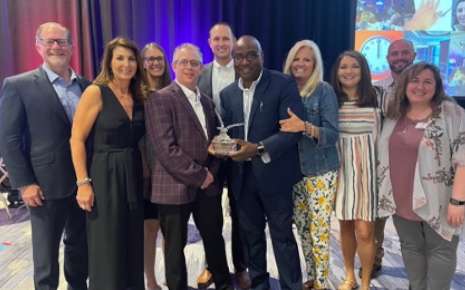When it comes to nonprofit leadership, the most common responsibilities include strategizing fundraisers or marketing the nonprofit's mission. But nonprofit leaders must also manage organizational risk, and while instances like fraud and theft may not be top-of-mind, there is a serious threat to nonprofits that can be easily overlooked: noncompliance.
To protect your nonprofit, maintaining compliance is a must. Let's review three compliance tips your nonprofit can follow to reduce its risk.
1. Standardize frequent filings
Whether your nonprofit is a new startup or has operated for several years, numerous federal and state filings are required to gain and maintain 501(c)(3) status. To keep all of them straight, standardize the filing process by:
- Assigning the task to a specific team. In the same way that you'd delegate tasks at a fundraising event, frequent filings can also be dispersed among team members. That way, filing will be more manageable for your team and each form will receive undivided attention.
- Creating a calendar for filings. To make sure important filings aren't forgotten amidst your fundraising efforts and community work, create a calendar that includes deadlines for different filings. For example, you might highlight a date on the calendar to renew your charitable solicitations registration. Share the calendar with your entire team to ensure everyone can reference it as needed.
- Keeping thorough records. The best way to set yourself up for success when reporting information to state or federal leadership is to keep thorough records. Standardize your record-keeping process to ensure your database is complete and organized. This can be especially helpful when filing Form 990, for which you'll need to report everything from major gifts to your nonprofit's activities throughout the year.
Roll out your standardization plan as part of a team-wide initiative to ensure everyone is on the same page. Even if some team members aren't actually responsible for completing the form, everyone's roles impact the information that is reported.
For example, your marketing team might have important data about the number of donations raised through a social media campaign. This team should know to record data following the same format as your financial team to keep a cohesive and hygienic database.
2. Self-evaluate regularly
Because the potential for noncompliance is widespread across every team, your organization must employ checks and balances to ensure risk is identified immediately where it exists. Create a self-assessment checklist that comprehensively analyzes each potential risk factor, such as:
- Bylaws: Keep your nonprofit's governance in check by regularly reviewing your bylaws. Not only should you check to ensure they're being followed, but you should also make sure they're still relevant and applicable. If a provision allows you to adjust them as needed, discuss any necessary changes with your team.
- Records: Check your records periodically to ensure they're accurate and thorough. Foundation Group's guide to Form 990 filing recommends recording all information as it happens to make sure your records are correct and detailed. For example, let's say your nonprofit just concluded a fundraiser to support a specific program. Record a description of the program, including the amount of money allocated to it and what the program ultimately accomplished.
- Board meetings: Review the frequency and efficiency of your board meetings. The meetings themselves can be used as opportunities to check for noncompliance issues, but you'll also need to check your board to protect against conflicts of interest, misalignment with bylaws, and other issues.
Consider asking for your team's feedback on the checklist. Are there any areas of their daily jobs that are at risk of noncompliance? Can your team identify any risks that leadership may have overlooked?
The larger the nonprofit is, the more chances there are for risks to become real issues. By following a checklist, you'll set concrete standards for your nonprofit's self-evaluation. That way, everyone will understand the expectations for how their teams should operate.
3. Recruit third-party help
Ultimately, your nonprofit aims to maximize its impact and fulfill its mission. Risk management can take your focus away from these important objectives, which is why outsourcing certain tasks can help streamline nonprofit compliance. Consider the following third-party resources at your disposal:
- Digital tools: Many tools dedicated to data management and recordkeeping can help your nonprofit track its most important details. Invest in a platform that records information such as funds raised, constituent involvement, and fundraising progress. Some software solutions will even create reports automatically to help organize your information and give you better insight into your data.
- Record-keeping experts: Enlist expert nonprofit bookkeeping services to record and analyze your nonprofit's financial transactions. Professional bookkeepers will not just maintain orderly records but also provide expertise in state and federal accounting rules. By trusting an expert with your nonprofit's records, bank statements, and other financial information, you can direct your focus toward your mission.
- Data appending services: A robust database can provide useful insight, guide nonprofit decisions, and, most importantly, maintain nonprofit compliance. Data appending fills gaps in your nonprofit's database by adding important information to your existing records. Recruit a service to append your data on behalf of your nonprofit, collecting details such as contact information and demographic data. According to Double the Donation, you can use this data to gain more comprehensive insights into your supporters. A clean database can also help you maintain accurate and up-to-date information that can be included in state and federal filings.
Whether you outsource the task completely or consult a professional for advice, a third-party expert can make sure you're on the right track. That's why it's important to carefully consider your nonprofit's compliance needs before enlisting the services of a professional. That way, whether you need advice, such as tips on nonprofit investments, or for someone to take over a task for you, you'll be equipped to narrow your search and find the resources that work most efficiently for your nonprofit.
________________________________________________
Nonprofit compliance is a serious undertaking, which is why your nonprofit should monitor it closely! To ensure your whole team works collectively to maintain compliance and avoid unnecessary risks, host workshops and training sessions to review the important compliance topics covered in this guide. Open communication keeps everyone on the same page while also allowing your team to speak up about potential compliance issues within the organization.






